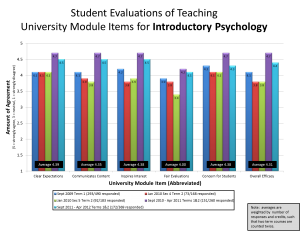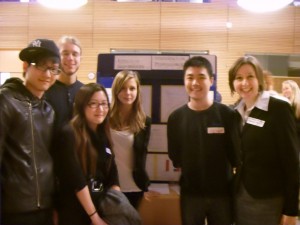Welcome to part two of my reflections on student evaluations of teaching from 2011/2012. Please see my earlier post for a general introduction and reflection on feedback from my Psyc 217 research methods course. I have also posted graphs that facilitate comparison across all my courses and years I have taught them.
First, I would like to thank each of my students who took the time to complete a student evaluation of teaching this year. I value hearing from each of you, and every year your feedback helps me to become a better teacher. Please note that with respect to the open-ended responses, I appreciate and consider every thoughtful comment. The ones I write about are typically those that reflect common themes echoed by numerous students.
The first thing I did to start reflecting on my intro student evals was to consider the numerical results (I am a quantitative scientist, after all!). After creating the graph below (click on it to enlarge), I noticed a small drop from last year’s intro psych class. This doesn’t surprise me a great deal for a couple of reasons: (1) last year’s results were the highest evaluations I ever received ever across any course, suggesting they’re a bit of an outlier, and (2) my class size increased by 42% this year relative to last year. An increase in class size from 270 to 370 students makes it that much more challenging to connect with students as individuals. All this said, I was pleased to note that students rated my teaching above 4 across all six of these questions. Compared with the first three bars, which denote my (relatively less positive) ratings during my first year of teaching these courses, I seem to be maintaining my ability to reach my students effectively. In sum: no concerns arose from the numerical data.

As I read the qualitative data, I was humbled. The most common comments noted appreciation for the enthusiasm I bring to each class. Here’s an example:
Dr. Rawn is one of the most engaging professors I’ve ever had – and she really made the class something that people became excited about, which is especially hard to do with a lecture hall consisting of 300+ students. Her passion was contagious! Great course, great instructor.
Given student feedback from this class and over all my years of teaching, I have learned that enthusiasm is one of my greatest strengths as a teacher. I try my best to bring enthusiasm for my students, for teaching, for the discipline to class every day. Without such consistent student feedback I would not necessarily know this about myself as a teacher. Therefore, over the years I have learned to cultivate that enthusiasm each day. Sometimes it takes work (I’ve been known to rev myself up to, ahem, Britney Spears or Pink from time to time…), but I find it’s always easier when I actually know at least some of my students personally. To this point, about a dozen students reported appreciating the Invitational Office Hour on Friday afternoons, which I will definitely keep given two consecutive years of positive feedback.
Exams Many students mentioned the exams and coverage of material, but unfortunately there wasn’t a consistent theme that I could use to make changes. Some people reported that there were too many/too detailed/covered too much, but others felt they were just right or too straightforward/easy. Of the three types of comments about exams, reports that exams were challenging in some way were the most frequent. Although I frequently make lots of changes to my teaching practice based on student feedback, making the exams in this course easier isn’t one I’m comfortable doing. The main reason is that I’m not getting feedback that the tests are unfair or unreasonable, either in qualitative responses or in the numerical data (in fact, this class’s rating on “fair evaluations” item is my highest of all my courses). It seems that a minority of students find them especially challenging, but the sentiment coming through is not one of unfairness (which was the case in my research methods course a couple of years ago, and I’ve been working to address it. Read more.). Here’s an example:
She is a good lecturer but her exams are very difficult even if you read the textbook and show up to each class you will find it very difficult to do well.
I have high expectations for my students — and my department does too. Our class average must be in the mid-60s, and over the past few years I’ve created exams that hit that mark. What I will think more about is how I can better reach this minority group of students who report struggling and feeling discouraged because of the exams. Given the above and similar comments, I’m wondering if part of what’s happening is that study strategies for high school are not working in university. I cover strategies in my syllabus and a bit at the start of the year, including in the memory unit, but I wonder if I/our TAs could develop some sort of extra special study strategies workshop to help reach out to these students who may need a bit more assistance. Maybe I can partner with the Learning Commons on this.
Finally, I’d like to share a few of the quotes that touched me deeply because they signal that my role in these students’ lives was bigger than simply being their intro psych prof. Notes like these are humbling, and fuel my passion for this challenging career.
Overall amazing instructor that taught us through example how to respect others, care about the science of psychology, and take initiative with our learning.
Although I initially thought I would not enjoy being taught by Dr. Rawn, mostly due to her excitedness, I actually felt that her passion for psychology made it more interesting to learn, and the obvious effort she put into teaching was superb. If she sees this I just want to say Thanks!
Really impressive to watch Dr. Rawn work. She knows an incredible number of students’ names, puts in a lot of effort to get to know them individually, and can really hold her own in a 400-seat hall. Her enthusiasm for the subject is matched by an effective and accessible teaching style, and she manages to incorporate an impressive amount of discussion and classroom activities for such a large class. I think it wouldn’t hurt to lay down the smack a bit harder with the kids at the back of the hall, even to the point of kicking them out. Why put up with that? Nonetheless, a really inspirational role model as a scholar, teacher, and an intelligent and talented woman.
Many thanks to each and every one of you for helping me to improve my teaching by signalling both strengths and areas in which I can grow. I wish you the best.
Stay tuned for more course reflections…!

 Follow
Follow

